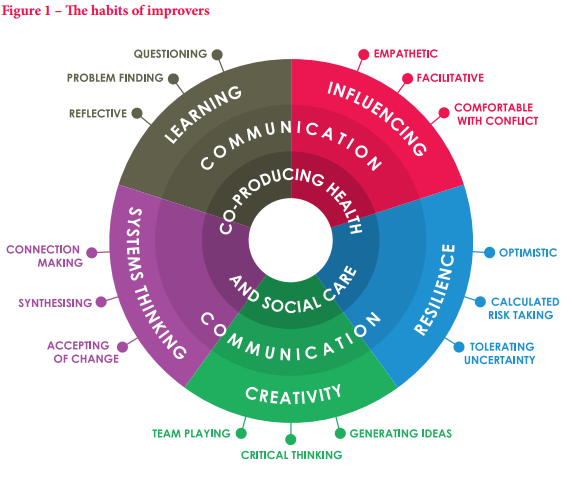Learning is part of everything we do in improvement and is one of the core elements of Q. Understanding our own development needs is an important place to start, and it was with that in mind that we set out to find ways to help Q members self-assess their improvement capability.
What at first seemed a relatively straightforward task proved to be anything but. As Joy Furnival, Q member discusses here, there’s no single conceptualisation of improvement capability and the jury is out on whether it comprises the skills of individuals and/or organisations. The many views on what improvement capability is means there is no single way of assessing it either. Set that within the context of Q, an intentionally diverse network of improvers with a variety of backgrounds and expertise, and the realisation dawned that we were unlikely to be able to present members with a neat one size fits all tool to self-assess against!
We have tried hard to find useful self-assessment tools and to curate some of them here
That said, we have tried hard to find useful self-assessment tools and to curate some of them here. Joy has already done a systematic literature review, and we were also mindful that many such tools exist in grey literature and behind organisational firewalls. We trawled the internet non-systematically but as comprehensively as possible, used our networks to ask for insight and leads, and spread word of our search via social media. The result has been a variety of tools addressing improvement capability from different perspectives.
For those of you keen to self-assess your individual improvement capabilities, this survey developed by the South West Academic Health Science Network focuses on individual improvement skills, including ability with different QI technical tools and techniques, leadership for improvement and change management. Anyone feeling like a data interpretation challenge can test themselves with an IHI tool here (answers also available).
From Quality2020, this attributes competence framework aims to assist individuals in assessing their current performance (in terms of knowledge, skills and attitudes) in relation to leadership for quality improvement and safety. For those with a particular focus on leadership, the NHS Leadership Academy Framework may provide a useful platform for self-reflection and includes a maturity model (pg 13-19), whilst members interested in taking an organisation level approach to improvement capability self-assessment might find the IHI tool a useful starting point.
Although skills and knowledge are one way to think about improvement capability they are not the only lens through which development can be viewed
Although skills and knowledge are one way to think about improvement capability they are not the only lens through which development can be viewed. Habits of an Improver frames the conversation around learning for improvement with five desirable improvement habits. Learning, influencing, resilience, creativity and systems thinking are described as five dimensions of improvement, and whilst not all of those habits are necessarily found in a single person or team, they serve as a holistic ideal. The diagram below, taken from that publication, may also serve as a useful catalyst for self-reflection.
 If you’ve got this far through the post, then we’re interested to know how you’ve responded. How have you thought about your or your team’s improvement capability? Have you used any of these tools before? We won’t know how many of you click on those links, or how useful you find them unless you tell us – so please do by replying to this blog. We also know that there is more out there than we have found so far, so if you know of a useful QI capacity self-assessment tool we can add to those here please send it our way. Whether or not you use a formal tool, it would be good to hear about how you reflect on your improvement skills and attributes in order to decide where to focus your development.
If you’ve got this far through the post, then we’re interested to know how you’ve responded. How have you thought about your or your team’s improvement capability? Have you used any of these tools before? We won’t know how many of you click on those links, or how useful you find them unless you tell us – so please do by replying to this blog. We also know that there is more out there than we have found so far, so if you know of a useful QI capacity self-assessment tool we can add to those here please send it our way. Whether or not you use a formal tool, it would be good to hear about how you reflect on your improvement skills and attributes in order to decide where to focus your development.
Rebecca Fisher is a GP and one of the National Medical Director’s Clinical Fellows. She’s working within the Improvement Directorate at The Health Foundation on a variety of projects, one of which is Q.
Comments
Nigel Coles 26 Apr 2023
6 years late but a very useful blog which has made me think much deeper about developing my own practice and but also others in my team.
Thanks